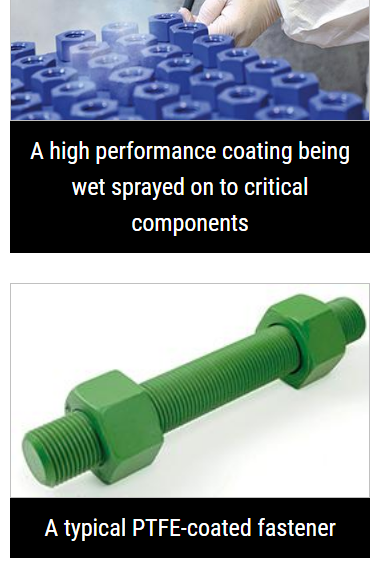Welcome to Sino Bearings web
24x7 HOTLINE:+86-28-81454188

 TECHNOLOGY
TECHNOLOGY
Carl Allison explains how next-generation coatings are meeting the challenges of the oil & gas industry
The often-extreme conditions and harsh environments associated with petrochemical plants and equipment mean that protection from factors such as corrosion (particularly in saltwater environments) heat, UV, harsh chemicals and abrasion is critical.
Many items such as fasteners, valves, seals, gaskets, risers and fittings require specialist coatings, broadly known as PTFE (polytetrafluoroethylene). In essence, these high-performance coatings combine two kinds of plastics – fluoropolymers (which have the lowest friction coefficient of any known solid) and high-temperature organic polymers. Together, they provide products that have a highly versatile set of properties, which includes improving corrosion resistance, reducing torque and eliminating galling (damage caused by two surfaces sliding against each other).
The majority of parts and machinery operating under pressure require some form of dry lubrication. Whether this is low-contact pressure applications (such as bearings and actuators) or extreme loads (such as valve springs, sealing rings and down-hole tools), specialist coatings systems have been proven to extend component life and enhance performance.
An added benefit is that PTFE coatings are available in a range of colours to aid product identification.
Specialist coatings systems also play a vital role in the production of tooling, with a broad range of release coatings available to cover most moulding applications. In addition to applying coatings to new mould tools, it is possible to strip old coatings, prepare and re-coat used moulds – thereby extending the life of the tool. The benefits of release coatings for this application are the elimination of other manually applied release agents (such as sprayed and brushed on) and usually an improvement in process efficiency.
The Merits of Thermoplastic Materials
Other applications require that certain pipeline or pipe fittings and components used in oil exploration are dipped or coated in thermoplastic materials. The advantages of thermoplastic solutions in this environment are the excellent corrosion resistance, chemical resistance, anti-flammability and low smoke and fume properties that the coatings offer. The unique properties of thermoplastic materials offer the manufacturer an opportunity to work the coating material in later operations. There are several applications where the applied coating is re-heated during the production process and a bonding agent is used for other materials and components to be robustly attached to the originally coated item. This is particularly common for filter screens and membranes.
Plastic Coatings Limited uses a number of PTFE products that are specifically designed for the petrochemical sector and which have a proven, successful track record in the field. These broadly span three main categories: extreme performance coatings; lubrication and release coatings; and abrasion and chemical resistance coatings.
Extreme performance coatings are well established in the industrial coatings market. Whilst these products are essentially lubricants, a broad range of additional properties makes them highly suited to applications in chemical and corrosive environments, at high temperatures or where components may be subjected to heavy loads.
Lubrication and Release Coatings
By varying chemical compositions, manufacturers have been able to develop economical solutions to suit a wide range of applications from PTFE lubrication, FEP (Fluorinated ethylene propylene) lubrication, to MoS2 applications for high-pressure applications where low friction is required.
To meet the common challenges faced by much of the equipment operating in the field, scientists have combined the benefits of two highly effective polymers; polyphenylene sulphide (PPS) and PTFE. PPS contributes chemical resistance at high temperatures, and excellent bonding and abrasion resistance whilst PTFE brings non-wetting attributes and wide-ranging chemical resistance. Together they can create coatings that resist most acids and alkalies, and are almost entirely unaffected by solvents up to 205°C.
Heavy-duty Coatings Ideal for Oil & Gas sector
Developed to extend the service life of large fasteners and related equipment, these tough coatings – some of which are referred to as “barrier” coatings – protect components from both chemical and mechanical damage. Key properties include good resistance to salt-spray, excellent acid-rain resistance, and protection from chemical exposure where high levels of pH is a factor.
Static electricity is also a common challenge for the oil & gas industry and heavy-duty coatings have been specifically developed to address the issue by modifying the basic formula. As a result, components can now be protected in a manner that will help to dissipate static electricity.
Other heavy-duty variations can be employed to reduce friction, facilitate make-up torque and lubricate parts that are required to operate under extreme pressure. Xylan 1425, for instance, provides long-lasting lubrication for bearing surfaces, withstanding pressures of up to 150,000 psi. Whilst traditional “moly” greases will tend to get washed away, this waterborne/VOC-compliant product combines PTFE and MoS2 to create a dual-lubrication system.
To summarise, there is a product to meet virtually every type of situation where components require protection or lubrication, and the coatings industry is continually formulating new solutions to meet the constantly evolving demands of the petrochemical sector.